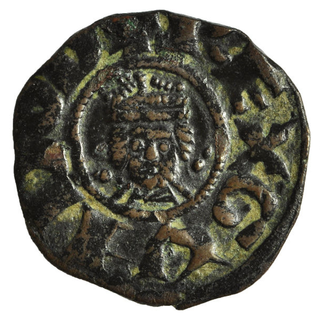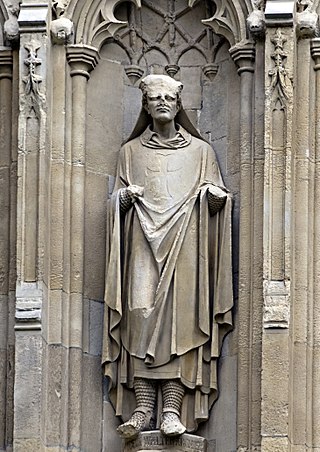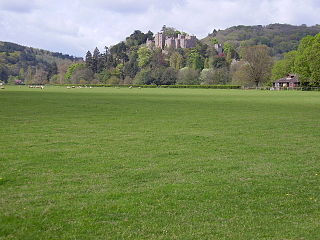Related Research Articles

Guy of Lusignan was King of Jerusalem, first as husband and co-ruler of Queen Sibylla from 1186 to 1190 then as disputed ruler from 1190 to 1192. He was also Lord of Cyprus from 1192 to 1194.

Hubert Walter was an influential royal adviser in the late twelfth and early thirteenth centuries in the positions of Chief Justiciar of England, Archbishop of Canterbury, and Lord Chancellor. As chancellor, Walter began the keeping of the Charter Roll, a record of all charters issued by the chancery. Walter was not noted for his holiness in life or learning, but historians have judged him one of the most outstanding government ministers in English history.

Sir Robert de Ros was an Anglo-Norman feudal baron, soldier and administrator who was one of the twenty-five barons appointed under clause 61 of Magna Carta to monitor its observance by King John of England.

Walter Hungerford, 1st Baron Hungerford was an English knight and landowner, from 1400 to 1414 a Member of the House of Commons, of which he became Speaker, then was an Admiral and peer.

Emeric, also known as Henry or Imre, was King of Hungary and Croatia between 1196 and 1204. In 1184, his father, Béla III of Hungary, ordered that he be crowned king, and appointed him as ruler of Croatia and Dalmatia around 1195. Emeric ascended the throne after the death of his father. During the first four years of his reign, he fought his rebellious brother, Andrew, who forced Emeric to make him ruler of Croatia and Dalmatia as appanage.
The Witch Hunter is a novel by Bernard Knight and the eighth book in his Crowner John Mysteries series. It was published in 2004 and like other books in the series, it is set in 12th century Exeter.
Events from the 1190s in England.

William Brewer of Tor Brewer in Devon, was a prominent administrator and judge in England during the reigns of kings Richard I, his brother King John, and John's son Henry III. He was a major landholder and the founder of several religious institutions. In 1204, he acquired the feudal barony of Horsley in Derbyshire.

Sir Philip Courtenay, of Powderham, Devon was the fifth son of Hugh Courtenay, 10th Earl of Devon (1303–1377). He was the founder of the cadet dynasty known as "Courtenay of Powderham", seated at the manor of Powderham, until then a former Bohun manor of little importance, whilst the line descended from his elder brother, the Earls of Devon of the mediaeval era, continued to be seated at Tiverton Castle and Okehampton.

Holcombe Burnell is a civil parish in the Teignbridge district, in Devon, England, the church of which is about 4 miles west of Exeter City centre. There is no village clustered around the church, rather the nearest village within the parish is Longdown. Only the manor house and two cottages are situated next to the church. The former manor house next to the church is today known as Holcombe Burnell Barton having subsequently been used as a farmhouse. The manor was in the historical Hundred of Wonford. In 2011 the parish had a population of 536.

Sir William Courtenay"The Great", of Powderham in Devon, was a leading member of the Devon gentry and a courtier of King Henry VIII having been from September 1512 one of the king's Esquires of the Body. He served as Sheriff of Devon three times: from February to November 1522, 1525/26, and 1533/34. He was elected Knight of the Shire for Devon in 1529.

Sir Lewis Pollard his will was of 1526 when he retired of Grilstone in the parish of Bishop's Nympton, Devon, was Justice of the Common Pleas from 1514 to 1526 and served as MP for Totnes in 1491 and was a JP in Devon in 1492. He was knighted after 1509. He was one of several Devonshire men to be "innated with a genius to study law", as identified by Fuller, who became eminent lawyers at a national level. He was a kinsman of the judge and Speaker of the House of Commons Sir John Pollard.
The feudal barony of Berry Pomeroy was one of eight feudal baronies in Devonshire, England, which existed during the mediaeval era. It had its caput at the manor of Berry Pomeroy, 20 miles south of the City of Exeter and 2 miles east of the town of Totnes, where was situated Totnes Castle, the caput of the feudal barony of Totnes. The exact location of the 11th-century baron's residence is unclear; perhaps it was next to the parish church on the site of the former rectory known as Berry House, as it is now believed that the nearby ruined Berry Pomeroy Castle was not built until the 15th century.

Sir Robert Dennis, JP of Holcombe Burnell in Devon, was a Member of Parliament for Devon in 1555 and served as Sheriff of Devon.
The Black Assizes is an epithet given to several outbreaks of "gaol fever" which struck various prisons and court-houses in England in the late 16th century and which caused the deaths of not only many prisoners awaiting trial but also the magistrates in the court buildings holding assizes.

The feudal barony of Okehampton was a very large feudal barony, the largest mediaeval fiefdom in the county of Devon, England, whose caput was Okehampton Castle and manor. It was one of eight feudal baronies in Devonshire which existed during the mediaeval era.
The manor of Bideford in North Devon was held by the Grenville family between the 12th and 18th centuries. The full descent is as follows:

The feudal barony of Dunster was an English feudal barony with its caput at Dunster Castle in Somerset. During the reign of King Henry I (1100–1135) the barony comprised forty knight's fees and was later enlarged. In about 1150 the manors retained in demesne were Dunster, Minehead, Cutcombe, Kilton and Carhampton in Somerset, and Ham in Dorset.
Sir Robert Chalons was an English courtier, soldier, administrator and politician from Devon.
Henry Fitzcount was an English nobleman. He was the illegitimate son of Reginald de Dunstanville, 1st Earl of Cornwall. Dunstanville died with no legitimate heir and his earldom reverted to the crown upon his 1175 death. Fitzcount afterwards received several grants of land in Devon and Cornwall. A loyalist during the First Barons' War of 1215–17, he was appointed Sheriff of Cornwall in 1215. Fitzcount was stripped of the post within two months as he had assumed the title of Earl without the king's permission. John and Fitzcount reconciled and he was reappointed as sheriff in 1216, being also granted farming rights across the whole of Cornwall. The grant of Cornwall was confirmed by John's successor Henry III but Fitzcount also incurred his displeasure and the county was taken into possession of the Crown in 1220. Fitzcount joined the Fifth Crusade around 1221 and died on that expedition in 1222.
References
- Contemporary Authors Online, Gale, 2009
- "Crowner Royal", Publishers Weekly, 24 August 2009.